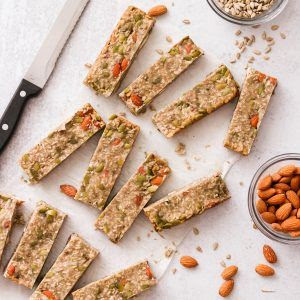KETO BEST PROTEIN BARS
The keto diet is a very low carb, high fat diet that’s associated with several health benefits, including weight loss.
For those following this diet, protein bars can be a convenient, grab-and-go option when you need a quick meal or filling snack. However, finding a keto-friendly bar can be difficult, as most protein bars are either too high in carbs or too low in fat.
Plus, even protein bars that meet the right criteria aren’t always healthy options, as they often contain large amounts of artificial ingredients, additives, and preservatives.
Still, if you look carefully, you can find protein bars that are both keto-friendly and nutritious. Alternatively, you can make them on your own.
There are some of the healthy keto-friendly protein bars:
MARIGOLD PROTEIN BARS
MariGold protein bars come in seven flavors and are renowned for their homemade taste and texture.
Each bar offers 2–3 grams of net carbs, 5–8 grams of fiber, 16–18 grams of fat, and an impressive 20–21 grams of protein. They’re made with just a few ingredients, including grass-fed whey protein powder.
Whey powder is a popular supplement because its protein can be quickly absorbed by your body. As a result, it may promote significant increases in strength, muscle mass, and even fat loss.
The bars are also free of sugar alcohols, which are natural or manufactured carbs that taste sweet yet contain half the number of calories as sugar. Some people may wish to avoid sugar alcohols because they can sometimes cause digestive distress.
Instead, these bars are sweetened with stevia, monk fruit extract, or a combination of the two. Both are zero-calorie, natural sugar alternatives.
KETO BARS
Founded in 2012, Keto Bars was one of the first companies to create protein bars specifically for the keto diet. In addition to being high in fat and low in net carbs, their bars are vegan, dairy-free, gluten-free, and soy-free.
All four of their flavors have short ingredient lists and are made with a base of unsweetened chocolate, coconut, and nut butter. To keep them sugar-free, Keto Bars use two alternative sweeteners-stevia and erythritol.
Erythritol is a sugar alcohol that occurs naturally in some fruits like watermelon and grapes, as well as fermented foods like cheese and wine. However, it can also be manufactured.
While the bars vary slightly in their calorie count and macronutrient content, they generally provide around 230 calories, 20 grams of fat, 3 grams of net carbs, 7 grams of fiber, and 6 grams of protein.
PERFECT KETO BARS
Perfect Keto designs its bars to provide just 2–3 net carbs per bar, along with around 17 grams of fat and 11 grams of protein.
Specifically formulated for the keto diet, these protein bars come in five flavors, including cinnamon roll, salted caramel, and chocolate chip cookie dough.
Keto-friendly bars like these regularly contain fiber and sugar alcohols, which your body can’t fully digest and absorb. Therefore, subtracting the grams of fiber and sugar alcohols from the total carbs gives you the number of net (digestible) carbs.
Perfect Keto bars have a relatively short ingredient list, which includes almond butter, tapioca fiber, cocoa butter, cashews, medium-chain triglyceride (MCT) oil, grass-fed collagen, and stevia.
DNX BARS
DNX Bars are made from free-range chicken or grass-fed bison or beef, they are free of added sugars. Additional ingredients include egg whites, dates, dehydrated vegetables, nuts, seeds, and spices.
For an extra boost of nutrition, the bars boast sacha inchi oil. Also called sacha peanut, sacha inchi (Plukenetia volubilis) is a plant that produces seeds that are rich in calcium, vitamin A, and essential omega-3 fatty acids, which may reduce inflammation.
It offer comparable amounts of nutrients. For example, their bar made from grass-fed beef, uncured bacon, and jalapenos provides 140 calories, 9 grams of fat, 1 gram of net carbs, 1 gram of sugar, and 14 grams of protein.
BHU KETO BARS
BHU’s keto-friendly protein bars have a fudgy texture and are made without any artificial sweeteners or preservatives. As a result, they need to be kept refrigerated.
One unique ingredient in these bars is organic tapioca flour, which contains prebiotic fiber. This nondigestable fiber helps feed beneficial bacteria in your gut, supporting proper digestion, a strong immune system, and heart health.
While all 5 flavors vary in nutrient content, each bar packs 200–270 calories, 15–18 grams of fat, 2–3 grams of net carbs, 8–11 grams of protein, and an impressive 9–12 grams of fiber.
PRIMAL KITCHEN PROTEIN BARS
All of the current five flavors are made from a base of nuts, egg whites, coconut oil, and various spices like cinnamon and nutmeg. They’re then sweetened with monk fruit extract and a touch of honey.
Many of the bars also contain flax seeds, which are an excellent source of plant-based omega-3 fatty acids. In addition to reducing inflammation, omega-3s are important for your heart, brain, and immune system.
Each bar provides approximately 200 calories, 16 grams of fat, 8–9 grams of protein, 6 grams of fiber, 2 grams of sugar, and 4 grams of net carbs.
ATLAS PROTEIN BARS
With 6 dessert-inspired flavors and a cookie dough consistency, Atlas protein bars offer approximately 200 calories, 11 grams of fat, 15 grams of protein, and 5 grams of net carbs each.
Unlike many competitors, Atlas doesn’t use any artificial sweeteners or sugar alcohols. Instead, each bar is lightly sweetened with monk fruit extract - a natural, zero-calorie sweetener.
Furthermore, the bars include two herbs considered to be adaptogens - ashwagandha extract and maca root powder. Research suggests that adaptogens may help manage stress, boost energy levels, and ease anxiety.
















0 Comments:
Post a Comment